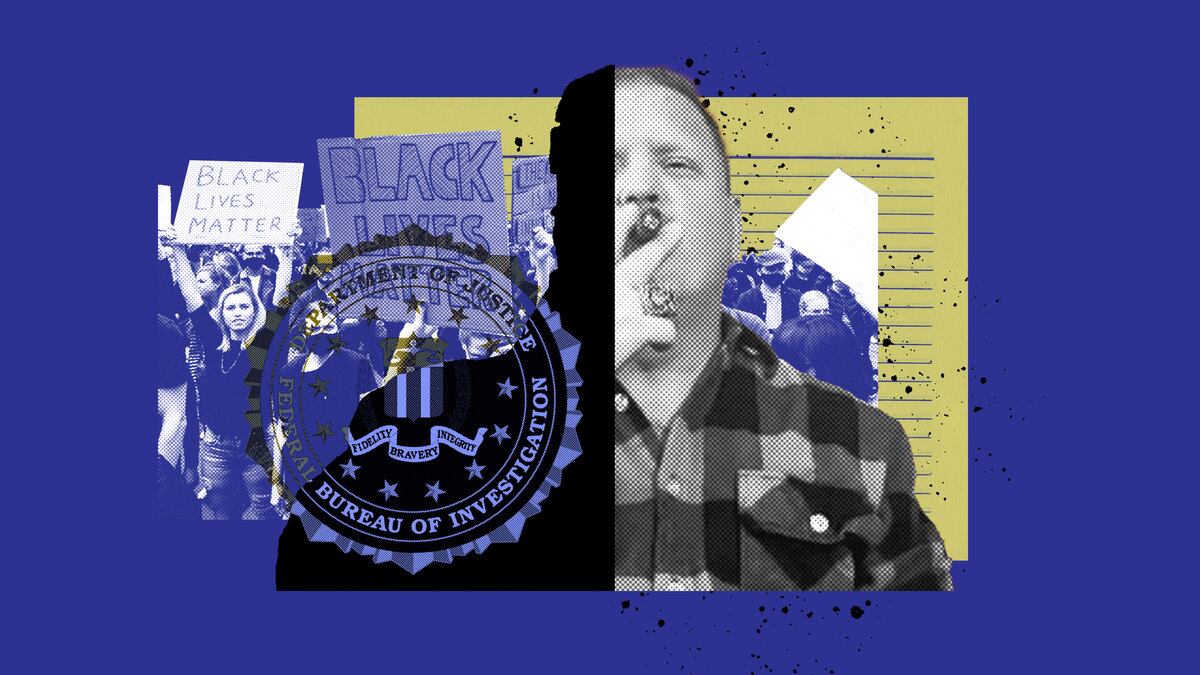An outlandish guerrilla militant who drove a silver Hearse to Denver-area Black Lives Matter protests in 2020 was secretly a federal informant with a sex crime conviction, a new podcast reveals.
The informant, Mickey Windecker, pushed an activist to buy a gun for him, resulting in the activist’s guilty plea on weapons charges. Other Denver-area activists accuse Windecker of inflaming otherwise-peaceful demonstrations, encouraging people to break windows, and leading marches directly into police traps. Windecker’s informant status was first reported this week on the podcast Alphabet Boys, which explores Windecker’s case and FBI involvement in the Colorado protests.
The Alphabet Boys podcast shared some of its documents, including recordings and an FBI summary report, with The Daily Beast, which corroborated those documents through court records and with other Colorado activists who’d encountered Windecker.
The FBI’s national and Denver offices declined to comment. Windecker did not return The Daily Beast’s requests for comment. He spoke on the phone to the Alphabet Boys podcast, after its host, Trevor Aaronson, left notes at his old apartment.
“If you post something, a story about me saying supposedly I work for the FBI, I will sue the shit out of you,” Windecker told Aaronson in a voicemail. “I will take you to court and I will break you off in court for defamation of character and slander. I have already notified my attorney about this. My previous landlord notified me and sent me these papers that you put on the old door that I used to live at, stating that I work for the FBI. I do not work for the FBI. I’ve never worked for the FBI. You get proof of me working for the FBI, then I’ll say otherwise, but there’s no proof because I didn’t work for them.”
Presented with documents and recordings that showed his work for the FBI, Windecker stopped responding to Aaronson.
Windecker made more than $20,000 working for the FBI during the summer of 2020, Aaronson reported, according to payment receipts. It is unclear whether those receipts represent the entirety of FBI payments to Windecker.
Windecker appeared on the Denver protest scene in the summer of 2020, when the nation was reeling from the on-camera murder of George Floyd by Minneapolis police. In Denver, Floyd’s killing also ignited a simmering anger over the death of Elijah McClain, a young Black man from nearby Aurora. McClain died in 2019 after police violently subdued him and injected him with nearly twice the amount of ketamine recommended for a person his size. The 23-year-old had been stopped by police after a 911 caller complained that he looked “sketchy.”
Colorado activist Azria Arroyo remembers encountering Windecker at one of the first protests she attended that summer.
“He stuck out like a sore thumb,” Arroyo told The Daily Beast. “He was in all camo with a hat, no mask, chuffing an unlit cigar.”

The camo she described were military fatigues with references to the Peshmerga, a Kurdish fighting force. Windecker had made headlines years before when he joined the Peshmerga to fight ISIS. Even then, his reputation was dubious. In 2015, The Daily Beast was the first to report that Windecker’s criminal record from Colorado was causing rifts among his fellow fighters in the Middle East. He’d been arrested 28 times, and convicted on counts ranging from impersonation of a police officer, to third degree sexual assault. Windecker had been 20 years old in the latter case. His victim was 14.
Windecker stood out from the Denver activist crowd in other ways. He drove a silver hearse full of weapons. He was white and in his mid-forties, while many of the protesters were young activists of color. And by mid-summer, he emerged as a voice of action in a local movement that had begun to stagnate.
Zebbodios Hall, a local man who joined the protests, told The Daily Beast he first spoke with Windecker by early July.
“People just talked to him. He was talking to everyone, getting people’s phone numbers,” Hall told The Daily Beast. “All these people think this dude’s alright.”
But Windecker wasn’t just talking to protesters, FBI documents reveal. He was talking to local and federal law enforcement.
Windecker “began having a working relationship with APD [Aurora Police Department] and DPD [Denver Police Department] in or around June 2020,” according to an FBI report from May 2021.
The report does not name Windecker, instead describing him as a “CHS” or “confidential human source.” But the document gives a detailed description of Windecker’s time with the Peshmerga, which aligns with Windecker’s résumé. The FBI report goes on to detail Windecker’s interactions with Hall, which later appeared in court records that used Windecker’s real name. Hall also confirmed that Windecker was the person described in the report.
The FBI document reveals that Windecker began focusing on Hall before officially working for the FBI at the end of July 2020. Some of Windecker’s reasons for suspicion, which are cited in the report, are dubious. Windecker told the FBI that he suspected Hall was only pretending to be a photographer.
“Hall never showed pictures of the protests to the CHS [Windecker],” the report reads. “CHS believed the camera Hall had on him was [another protester’s] camera and it didn’t even work.”
A quick Google search would have proved him wrong. Hall has multiple bylines at the Denver-based publication Westword, where he published reports and photo galleries from the summer’s racial protests. The second photo in one of the slideshows depicts Windecker’s silver hearse with the words “Elijah McClain didn’t deserve to be put here” written on the window.
Windecker didn’t just attend protests, multiple Denver-area activists said; he derailed them.
Arroyo said she saw Windecker at an August demonstration that “very quickly, once more people gathered, turned into something like ‘actually we should just go bust out some windows.’” Arroyo said she was suspicious of the demonstration’s turn, and moved to leave with some friends.
“Some of us became visibly uncomfortable. He started being like ‘come on you guys, Black lives matter, don’t they? Aren’t we all gonna do this?’” Soon thereafter, Windecker and the two people he’d arrived with “started blatant property damage on government buildings,” she said.
Arroyo and a fellow activist of color backed away, “freaked out, because we’re Black people in Denver,” she said. “We were like ‘this is not at all why we’re here.’”
Four other activists who spoke to The Daily Beast on the condition of anonymity, independently offered similar accounts of Windecker escalating tensions at protests.
During an August protest in Denver, “Mickey was right there with people smashing windows, arson and doing illegal activity,” an activist who asked to go by “Sophie” told The Daily Beast. “It's my understanding from a couple of activists that Mickey helped call and organize this action, and recruited people from the park meetings to bring shields and riot gear.”
On multiple occasions, Windecker led marches that ended up in police kettles, where he always seemed to avoid arrest, multiple people said.
One person, who attended demonstrations, recalled an incident during which Windecker led a march that collided with police and members of the far-right group the Proud Boys. “Mickey was the one giving most of the directions on how to get out,” the person said. “But every time we turned, it was always turning toward where the cops were hidden.”
Arrests were widespread during the summer of 2020. As an excuse for why he had not been arrested, Windecker claimed to have diplomatic immunity as a representative of Kurdistan, two people told The Daily Beast.
According to the FBI report, Windecker did work for the Kurdish government upon his return to the U.S. in 2016. The U.S. does not recognize the Iraqi region as its own nation with diplomats who receive immunity—but the excuse, versions of which appear in recordings on the Alphabet Boys podcast, was enough to give him some cover among activists, including Hall.
By late July, Hall said, he was growing frustrated with the protests. A Black father who tied the movement back to his grandparents’ experiences with racism, he viewed the 2020 protests as a chance for change. Instead he’d been hit in the head by a police munition, leading to chronic headaches and fits of fatigue. Someone had made death threats against him in connection to his role in the protests, he said.
He approached Windecker, who had talked a big game about his time hunting ISIS in Kurdistan. “I told him, I wanted to learn how to defend myself,” Hall told The Daily Beast.
Court documents confirm Hall’s version of events. “Mr. Hall later requested that Mickey provide military style training to Mr. Hall and others,” reads a plea agreement. “Mickey agreed to provide training to Mr. Hall but explained that he, Mickey, needed a firearm but could not purchase the firearm himself because he/Mickey was a convicted felon. Mr. Hall agreed to purchase the firearm for Mickey, after being told that Mickey was a convicted felon, and that Mr. Hall’s ‘straw’ purchase of the firearm for Mickey would be illegal.”
Hall says he was confused about the purchase’s legality, due to Windecker’s prior claims about being a diplomat, and the fact that Windecker already had many guns in the back of his hearse. Those guns were part of another motivation for Hall: fear.
“The judge asked me right before I was sentenced, ‘Did you do it because you were afraid?’ I said ‘Yeah. Why charge me?’” Hall recalled.
In August 2020, Windecker gave Hall $1,500 to buy a gun. The pair drove to a Bass Pro shop, where Hall bought a pistol under his name and gave it to Windecker. The following year, Hall was arrested and pleaded guilty to transferring a firearm to a felon.
“I don’t think it was right,” he said of his arrest. “I think it was entrapment. But no matter what, I did do it.”
Another area activist, Sarah Farley, told The Daily Beast that Windecker had been quick to bring up guns the first time she met him. “One of the first things Mickey started talking to me about was how he can get me firearms, no problem, and then train me on how to use them, out in the mountains somewhere in Colorado,” Farley said. “I was like ‘Oh, haha, no, I don’t really want to go out to the mountains to shoot guns with a stranger.’”
Windecker was involved in another case tied to the Denver Black Lives Matter movement. That case, while making headlines, did not result in criminal charges. In conversations with Windecker, another local activist named Bryce Shelby expressed enthusiasm for plans to commit political assassinations, according to an FBI report. The report states that Windecker “set up a lunch with Shelby and Hall,” which Windecker recorded. News reports from the time state that Shelby drove by the house of a prospective target more than once, and talked to an undercover agent about his willingness to “pull the trigger.”
Shelby did not return The Daily Beast’s request for comment, and his reported talk about assassinations never amounted to a criminal case. Instead, a judge used the comments to seize Shelby’s guns under Colorado’s “red flag” law, which allows police to temporarily remove firearms from someone who is believed to pose an immediate threat.
The use of undercover informants in criminal plots is controversial. Undercover agents are often accused of directing the plot, cajoling participants into joining or taking more extreme actions. (Such concerns have plagued the trial of a right-wing militia group accused of plotting to kidnap Michigan governor Gretchen Whitmer. A judge rejected an entrapment argument in the case.)
But even without the court cases, Windecker had a chilling effect on Denver’s racial justice movement, exploiting divisions in the Denver activist scene, according to multiple witnesses and an FBI report.
“The information CHS was receiving from the different groups at protests was like a ‘flash flood,’” reads the FBI document. “There were different groups with different agendas trying to take advantage of the protests.”
Hall, Arroyo, and two other activists said Windecker gained a faithful following among some members of a Young Democratic Socialists of America chapter. (That chapter has since disbanded. One former chapter leader, whom multiple people identified as a key Windecker ally, returned a text message from The Daily Beast, but stopped responding when asked about Windecker.)
Hall and others said YDSA members did reconnaissance for Windecker, scouting out marching routes at protests. The YDSA activists, predominantly in their late teens and early twenties, came into conflict with other protesters, as the protest scene turned chaotic.
Amid a rash of arrests, locals suspected an informant in their midst and began accusing each other.
“If you were Black and had some kind of role and spoke at some point, you’re a snitch. It was just happening like that. Random white people would be accused of it,” Hall said. “But when all the Black people were labeled these things, or crazy, I think that made people feel defeated. What was left, I think, were people who were just pushing other folks away.”
One of the activists who requested anonymity said the mistrust helped unravel an activist scene that was just starting to get its act together. “Things were starting to get stronger,” the person said. “Relationships and bonds were starting to get stronger, and Mickey came in and just started poking holes through everything.”
By September 2020, Windecker had earned enough ill will that the group Colorado Springs Anti-Fascists published a Twitter thread highlighting Windecker’s criminal history and cautioning people against protesting alongside him.
The accusations contributed to Hall’s increasingly negative outlook on Windecker. YDSA members would be some of the last area activists to stand by Windecker, earning the group a condemnation from the Boulder County DSA.
Windecker, meanwhile, filmed a video accusing the Colorado Springs Anti-Fascists of being a front for a police officer or a Proud Boy. (The group denies the charge.)
“If you’re trying to implicate that I’m a fucking snitch, well check this out,” Windecker said in the video. “Three things I ain’t: I ain’t a punk, I ain’t a bitch, and I ain’t a fucking snitch.”
Windecker has vanished from the Colorado protest scene. Hall says he hasn’t heard from him since Windecker texted him in 2021, a few days before the FBI arrested Hall for giving Windecker a gun.
The guilty plea has already hurt Hall’s career chances, he said. Previously an IT worker, he’s been cast out of several companies’ hiring processes when he discloses his recent felony, even getting passed over for a delivery gig with DoorDash, because his felony was gun-related.
But he and other activists said they weren’t surprised to learn that Windecker was an informant—it was proof that they hadn’t been paranoid.
“The felony’s well worth it, if this gets it all out,” Hall said.







